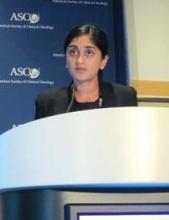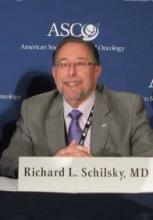CHICAGO – A full 83% of U.S. oncologists reported being unable to prescribe the preferred chemotherapy agent for their cancer patients because of persistent drug shortages, according to a survey of 250 oncologists.
Nearly 70% of those surveyed said their cancer centers or practices had no formal guidance on how to manage the allocation of cancer drugs in short supply, Dr. Keerthi Gogineni reported in a press briefing at the annual meeting of the American Society of Clinical Oncology.
Due to the shortages, oncologists reported switching regimens (78%), substituting alternate drugs partway through therapy (77%), delaying treatment (43%), omitting doses (29%), reducing doses (20%) and referring patients to other practices (17%).
More than a third (37%) reported having to choose between patients who needed a particular drug, said Dr. Gogineni, a clinical instructor at the Abramson Cancer Center, University of Pennsylvania, Philadelphia. This poses ethical dilemmas for clinicians about who should get preference for a drug – the patient with early stage disease being treated with curative intent, the patient with metastatic disease who needs to abate disease spread, or those enrolled in clinical trials.
Data were not available on whether substitutions or delays affected patients’ quality of life, she said. An earlier study reported showed that a shortage of the chemotherapy drug mechlorethamine, or nitrogen mustard, led to a greater risk of relapse for some young Hodgkin’s lymphoma patients (N. Engl. J. Med. 2012;367:2461-3).
ASCO’s ethics committee has developed a white paper that is under review and will provide a series of recommendations to help oncologists deal with the allocation of cancer drugs in shortage, Dr. Richard Schilsky, ASCO chief medical officer, told reporters. The paper will provide overall guidance on management strategies, but cannot possibly address the multitude of scenarios that physicians face in each of the various cancers, he said in an interview.
ASCO surveyed 390 members in October 2012 and 462 members in April 2013 to monitor the impact of the shortages and regulatory/legislative efforts such as changes in generic drug user fees that would provide added resources to the Food and Drug Administration to expedite the review of generic drugs.
The ASCO survey results are similar to those in the survey reported by Dr. Gogineni and "suggest there’s been some amelioration of the drug shortages, but not to a major extent," Dr. Schilsky said.
In the 2013 ASCO survey, 58% of physician-members said the shortages were better and 17% said they were worse than in the fall of 2012. The latter may reflect scarcities of supportive care agents such as basic IV fluids, antiemetics, and pain medications that are necessary to provide optimal care to cancer patients, but "are in even worse supply, perhaps, than the chemotherapy drugs themselves," Dr. Schilsky said.
In addition, the continued persistence of unavoidable drug substitutions is troubling both for patient care and cost implications.
Among 202 ASCO members who gave specific examples of ongoing substitutions, 38% mentioned substitution of the branded drug levoleucovorin (Fusilev) for generic leucovorin, and 12% mentioned substitution of capecitabine (Xeloda) for 5-flurouracil/leucovorin.
In the Pennsylvania survey, 22% of physicians faced with shortages of 5-FU, a generic drug that forms the chemotherapy backbone for several gastrointestinal cancers, reported substituting capecitabine, which costs about 140 times as much as 5-FU for one round of colon cancer treatment, according to the investigators.
Overall, nearly 60% of physicians reported substituting more expensive branded drugs when cheaper generic drugs were in shortage, Dr. Gogineni said.
At the time the survey was conducted between September 2012 and January 2013, the top five drugs in shortage were leucovorin (66%), liposomal doxorubicin (62%), 5-FU (19%), bleomycin (17%), and cytarabine (16%).
Nearly 13% of the time, drug shortages prevented enrollment in a clinical trial, delayed administration of a study drug, or disrupted involvement of patients in clinical trials, according to the study, which was coauthored by Dr. Ezekiel Emanuel, chair of medial ethics and medical policy at the University of Pennsylvania.
Dr. Gogineni reported research funding from Pfizer, which supported the study in part through a medical and academic partnership research fellowship.



